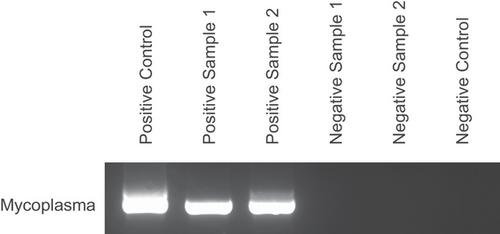Eliane J. Mueller, Siavash Rahimi, Patrizia Sauta, Taravat Shojaeian, Laurence Durrer, Soraya Quinche, Michael Francois, Elisabeth Locher, Monika Edler, Marlies Illi, Thomas Gentinetta, Kelvin Lau, Florence Pojer, Luca Borradori, William V. J. Hariton
下载PDF
{"title":"用于转化性丘疹性荨麻疹研究的抗去疱疹素 3 抗体 AK23 的标准化生产。","authors":"Eliane J. Mueller, Siavash Rahimi, Patrizia Sauta, Taravat Shojaeian, Laurence Durrer, Soraya Quinche, Michael Francois, Elisabeth Locher, Monika Edler, Marlies Illi, Thomas Gentinetta, Kelvin Lau, Florence Pojer, Luca Borradori, William V. J. Hariton","doi":"10.1002/cpz1.1118","DOIUrl":null,"url":null,"abstract":"<p>Antibody-mediated receptor activation is successfully used to develop medical treatments. If the activation induces a pathological response, such antibodies are also excellent tools for defining molecular mechanisms of target receptor malfunction and designing rescue therapies. Prominent examples are naturally occurring autoantibodies inducing the severe blistering disease pemphigus vulgaris (PV). In the great majority of patients, the antibodies bind to the adhesion receptor desmoglein 3 (Dsg3) and interfere with cell signaling to provoke severe blistering in the mucous membranes and/or skin. The identification of a comprehensive causative signaling network downstream of antibody-targeted Dsg3 receptors (e.g., shown by pharmacological activators or inhibitors) is currently being discussed as a basis to develop urgently needed first-line treatments for PV patients. Although polyclonal PV IgG antibodies have been used as proof of principle for pathological signal activation, monospecific anti-Dsg3 antibodies are necessary and have been developed to identify pathological Dsg3 receptor–mediated signal transduction. The experimental monospecific PV antibody AK23, produced from hybridoma cells, was extensively tested in our laboratory in both in vitro and in vivo models for PV and proved to recapitulate the clinicopathological features of PV when generated using the standardized production and purification protocols described herein. © 2024 The Author(s). Current Protocols published by Wiley Periodicals LLC.</p><p><b>Basic Protocol 1</b>: Bovine IgG stripping from FBS and quality control</p><p><b>Basic Protocol 2</b>: AK23 hybridoma expansion and IgG production</p><p><b>Basic Protocol 3</b>: AK23 IgG purification</p><p><b>Basic Protocol 4</b>: AK23 IgG quality control</p><p><b>Support Protocol 1</b>: Detection of endotoxin levels</p><p><b>Support Protocol 2</b>: Detection and removal of mycoplasma</p>","PeriodicalId":93970,"journal":{"name":"Current protocols","volume":"4 8","pages":""},"PeriodicalIF":0.0000,"publicationDate":"2024-08-22","publicationTypes":"Journal Article","fieldsOfStudy":null,"isOpenAccess":false,"openAccessPdf":"https://onlinelibrary.wiley.com/doi/epdf/10.1002/cpz1.1118","citationCount":"0","resultStr":"{\"title\":\"Standardized Production of Anti-Desmoglein 3 Antibody AK23 for Translational Pemphigus Vulgaris Research\",\"authors\":\"Eliane J. Mueller, Siavash Rahimi, Patrizia Sauta, Taravat Shojaeian, Laurence Durrer, Soraya Quinche, Michael Francois, Elisabeth Locher, Monika Edler, Marlies Illi, Thomas Gentinetta, Kelvin Lau, Florence Pojer, Luca Borradori, William V. J. Hariton\",\"doi\":\"10.1002/cpz1.1118\",\"DOIUrl\":null,\"url\":null,\"abstract\":\"<p>Antibody-mediated receptor activation is successfully used to develop medical treatments. If the activation induces a pathological response, such antibodies are also excellent tools for defining molecular mechanisms of target receptor malfunction and designing rescue therapies. Prominent examples are naturally occurring autoantibodies inducing the severe blistering disease pemphigus vulgaris (PV). In the great majority of patients, the antibodies bind to the adhesion receptor desmoglein 3 (Dsg3) and interfere with cell signaling to provoke severe blistering in the mucous membranes and/or skin. The identification of a comprehensive causative signaling network downstream of antibody-targeted Dsg3 receptors (e.g., shown by pharmacological activators or inhibitors) is currently being discussed as a basis to develop urgently needed first-line treatments for PV patients. Although polyclonal PV IgG antibodies have been used as proof of principle for pathological signal activation, monospecific anti-Dsg3 antibodies are necessary and have been developed to identify pathological Dsg3 receptor–mediated signal transduction. The experimental monospecific PV antibody AK23, produced from hybridoma cells, was extensively tested in our laboratory in both in vitro and in vivo models for PV and proved to recapitulate the clinicopathological features of PV when generated using the standardized production and purification protocols described herein. © 2024 The Author(s). Current Protocols published by Wiley Periodicals LLC.</p><p><b>Basic Protocol 1</b>: Bovine IgG stripping from FBS and quality control</p><p><b>Basic Protocol 2</b>: AK23 hybridoma expansion and IgG production</p><p><b>Basic Protocol 3</b>: AK23 IgG purification</p><p><b>Basic Protocol 4</b>: AK23 IgG quality control</p><p><b>Support Protocol 1</b>: Detection of endotoxin levels</p><p><b>Support Protocol 2</b>: Detection and removal of mycoplasma</p>\",\"PeriodicalId\":93970,\"journal\":{\"name\":\"Current protocols\",\"volume\":\"4 8\",\"pages\":\"\"},\"PeriodicalIF\":0.0000,\"publicationDate\":\"2024-08-22\",\"publicationTypes\":\"Journal Article\",\"fieldsOfStudy\":null,\"isOpenAccess\":false,\"openAccessPdf\":\"https://onlinelibrary.wiley.com/doi/epdf/10.1002/cpz1.1118\",\"citationCount\":\"0\",\"resultStr\":null,\"platform\":\"Semanticscholar\",\"paperid\":null,\"PeriodicalName\":\"Current protocols\",\"FirstCategoryId\":\"1085\",\"ListUrlMain\":\"https://onlinelibrary.wiley.com/doi/10.1002/cpz1.1118\",\"RegionNum\":0,\"RegionCategory\":null,\"ArticlePicture\":[],\"TitleCN\":null,\"AbstractTextCN\":null,\"PMCID\":null,\"EPubDate\":\"\",\"PubModel\":\"\",\"JCR\":\"\",\"JCRName\":\"\",\"Score\":null,\"Total\":0}","platform":"Semanticscholar","paperid":null,"PeriodicalName":"Current protocols","FirstCategoryId":"1085","ListUrlMain":"https://onlinelibrary.wiley.com/doi/10.1002/cpz1.1118","RegionNum":0,"RegionCategory":null,"ArticlePicture":[],"TitleCN":null,"AbstractTextCN":null,"PMCID":null,"EPubDate":"","PubModel":"","JCR":"","JCRName":"","Score":null,"Total":0}
引用次数: 0
引用
批量引用


 求助内容:
求助内容: 应助结果提醒方式:
应助结果提醒方式:


